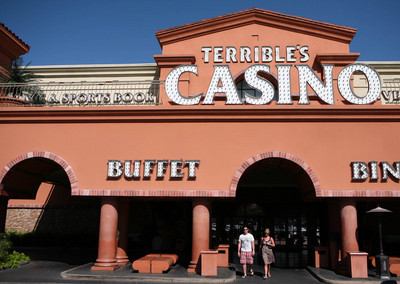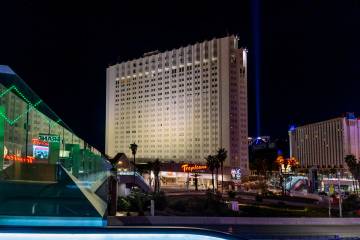Herbst Gaming faces hurdles
Casino operator and slot machine route manager Herbst Gaming may be forced to file for bankruptcy protection unless the company can reorganize a payment structure for its more than $1.146 billion debt, according to documents filed with the U.S. Securities and Exchange Commission.
The Las Vegas-based company said its Southern Nevada operations have been negatively affected by failing economic conditions, a statewide ban on smoking in taverns and restaurants, and competition from American Indian casinos in Southern California.
Herbst Gaming operates 16 casinos in Southern and Northern Nevada, including the three Primm resorts along Interstate 15 at the California-Nevada border, 35 miles south of Las Vegas, and the off-Strip Terrible's on East Flamingo Road. The company also owns three casinos in Missouri and Iowa and operates approximately 7,200 slot machines through its Nevada route operation.
The company is privately held by brothers Ed, Tim and Troy Herbst, but roughly $800 million of its debt is through publicly traded bonds.
In its Form 10-K annual report filed late Monday with the SEC, Herbst Gaming said the poor financial results the company experienced during the second half of 2007 have carried over into the first few months of 2008.
Herbst's overall revenues were $849.2 million in 2007, almost 43 percent higher than 2006, because the company spent $543 million to acquire two major casino companies, almost doubling the size of its casino holdings.
However, a 20 percent loss in revenues from its slot route business, coupled with a doubling of the company's costs, expenses and interest payments, sent Herbst Gaming to a net loss of $127.2 million last year.
In February, Herbst hired Wall Street investment house Goldman Sachs to evaluate strategic alternatives for the company, which could include anything from a debt recapitalization to a sale of some of its businesses.
According to an independent audit of the company's finances by Deloitte & Touche, Herbst Gaming has "going concern" qualification, which is a default under its credit agreement with its bond holders. The company plans to discuss the matter soon with its bond holders to try and restructure the debt.
"We and our advisers are actively working toward such a transaction that would address the decline in our operating results and our capital structure, including our outstanding indebtedness," the company said in the filing.
If Herbst Gaming cannot complete a refinancing or restructuring, the company may be required to seek protection under Chapter 11 of the U.S. Bankruptcy Code.
Herbst Gaming general counsel Sean Higgins declined comment Tuesday, saying the 10-K filing would speak for the company. Herbst Gaming is not planning to hold a conference call to discuss its 2007 year-end and fourth-quarter earnings.
Gaming Control Board Chairman Dennis Neilander said casinos operated by Herbst Gaming would be placed on a different status than other licensees because of the company's financial warnings. Additional audits of the finances and bankrolls at each location will be conducted.
Neilander said the control board became aware of Herbst's financial issues as they mounted over the last six months.
"This is not a new scenario for us," Neilander said, saying the Aladdin on the Strip and Fitzgeralds in Reno were the last casinos to operate under bankruptcy protection. "It's tough because they were hit by so many factors at the same time. At this point, technically, this is the process we have to take."
An investment source with knowledge of the situation said Herbst Gaming wants to resolve the matter without filing for bankruptcy. The source said banks that control about $320 million of Herbst's debt are pushing for some sort of resolution. The source said the bank debt is currently worth about 70 cents on the dollar while the bond debt is worth about 14 cents on the dollar.
Several sources said Herbst's downfall began with last April's $394 million purchase of the three Primm casinos from MGM Mirage.
"They overpaid, pure and simple," said a gaming source who asked not to be named.
In January 2007, Herbst paid $149 million to acquire five Northern Nevada casinos, including the Sands Regency in Reno.
During Nevada licensing hearings in March 2007, Herbst executives admitted cash flow at the Primm casinos had fallen from $75 million in 2000 to about $30 million in 2003 because of Indian gaming competition. Executives told regulators they were confident they could win back lost business. A year later, it hasn't happened.
Sources confirmed that Primm executive Michael Puggi, who had been operating the resorts for MGM Mirage and was retained by Herbst, was recently let go. In the 10-K, the company said the Primm casinos continue to lose business to the expanding California Indian casinos in Riverside County and San Bernardino County.
"The Primm casinos derive a significant amount of their business from the Inland Empire region of Southern California, the economies of which have been negatively impacted due to a number of factors, including the subprime mortgage crisis and higher gasoline costs," Herbst Gaming stated.
In its slot machine route operation, Herbst blamed a voter-enacted statewide ban on smoking in places that serve food with sending its tavern and restaurant customers to traditional casinos if they want to smoke and gamble. The ban started in January 2007.
Not only have revenues in the route operation fallen, $276.9 million in 2007 compared with $347 million in 2006, but cash flow from the division was off more than 56 percent, $32.8 million in 2007 compared with $75.5 million in 2006.
Herbst Gaming said it has renegotiated several lease agreements and has decreased its annual rent payments by approximately $20 million.
"However, if we are not able to offset decreased patron play, or patron play continues to decrease, there may be a material adverse effect on our business, financial condition and results of operations," the company stated. "The success of our route operations is dependent on our ability to renew our contracts."
Contact reporter Howard Stutz at hstutz@reviewjournal.com or (702) 477-3871.




























